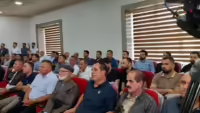'There is nothing left'
Lives shattered as Turkey-PKK conflict devastates Duhok villages
DUHOK — In the rugged mountains of Duhok Governorate, scores of villages are now silent and abandoned, with smoke still rising from the remains of homes and orchards. For the villagers of Kani Mase in Amedi district, Turkish military operations have turned their lives upside down, leaving their homes in ruins.
Among those affected is Khayri Hakim, a villager from Dargala Mesa, whose home was reduced to rubble by the Turkish army. “Our village has been demolished, and all the houses have been abandoned; the vineyards and gardens have been burned,” he says, his voice filled with anguish. Reflecting on the devastation, Hakim adds, “The Anfal campaign of 1988 was not like this. During Anfal, houses were not demolished.”
The Turkish military’s recent operations in the region, aimed at targeting fighters from the Kurdistan Workers’ Party, or PKK, have led to the evacuation of seven villages in Kani Mase. Residents like Hakim have been caught in the crossfire, forced to flee with what little they could carry. Now, most are living in Duhok city as renters, unsure when—or if—they will be able to return to the places they once called home.
Kamaran Osman, the coordinator for the Community Peacemaker Teams’s Kurdistan Region operation, confirmed to 964media that Jimbilke has been fully evacuated. Since the recent Turkish incursion into Duhok governorate, 10 villages have been deserted, including five in the Kani Mase subdistrict, four in the Gara region, and one in the Batifa district.
According to statistics from the Amedi district administration, there are 358 villages in the district, of which 201 are deserted.
Salah Kamel, the village head of Dargala Mesa, recounts how his village, once home to 21 families, was systematically destroyed. “The Turkish army destroyed our water sources and brought their conflict with the PKK into the village,” he explains. “Two houses were bombed by aircraft, and the entire orchard has been burned down. Those who had livestock sold them and moved to Duhok, becoming renters.”
For many villagers, the loss is not just of property but of a way of life that has sustained them for generations. “Everything is gone,” Hakim laments. “What the Turkish army is doing now is even worse than the Anfal campaigns. At least during Anfal, we had homes to come back to. Now, there is nothing left.”
The Anfal campaign, carried out by Saddam Hussein’s regime in 1988, was one of the darkest chapters in Kurdish history, marked by systematic violence, mass killings, and the use of chemical weapons against Kurdish civilians in northern Iraq. Beyond the estimated 50,000 to 100,000 deaths, approximately 182,000 Kurds went missing, their fate still unknown. Many were forcibly taken from their homes, transported to remote locations, and never heard from again, their bodies believed to be buried in mass graves that remain undiscovered to this day. Entire villages were destroyed, and hundreds of thousands of Kurds were displaced in an effort to erase their presence from the region.
The sense of despair among those displaced is palpable. “Now, most of the villagers are in the city of Duhok, living as renters,” Hakim says. “The Turkish army will not allow us to return to our village, and even if they did, there is nothing left for us—everything has been destroyed.”
The Turkish military’s recent incursion into the Berwari Bala and Amedi regions has created a tense and volatile situation. Villages like Dargala Mesa, Shelaza, Gwelka, Beshile, Miska, Chimbelke, and Tweshambike have been emptied, their residents displaced and desperate for answers. Despite pleas from local leaders and villagers, there has been no word on when, or if, they will be allowed to return.
According to a report by the American human rights organization Community Peacemaker Teams – Iraqi Kurdistan, published on August 14, since 1991, 425 civilians in the Kurdistan Region have died, and 420 others have been injured due to military attacks by Turkey and Iran. The report highlights that the majority of these casualties—totaling 845 civilians either killed or wounded—have resulted from Turkish military actions.
The CPT report on military operations in the Kurdistan Region indicates that Turkish military actions are responsible for the majority of civilian casualties in the region, with over 83% of such incidents attributed to these operations. Specifically, between 2018 and 2024, intensified Turkish military campaigns have significantly impacted civilian life. By the summer of 2024, these operations had propelled Turkish forces 15 kilometers into the region, necessitating the evacuation of multiple villages.
Hakim fought back tears as he looks back on the life he has lost. “Two days after we evacuated, images of my ruined home were broadcast on the news,” he recalls. “It was a shock that I will never forget.”

Village in Amedi evacuated as Turkey-PKK conflict escalates

Turkey-PKK clashes hit agricultural output in Duhok

